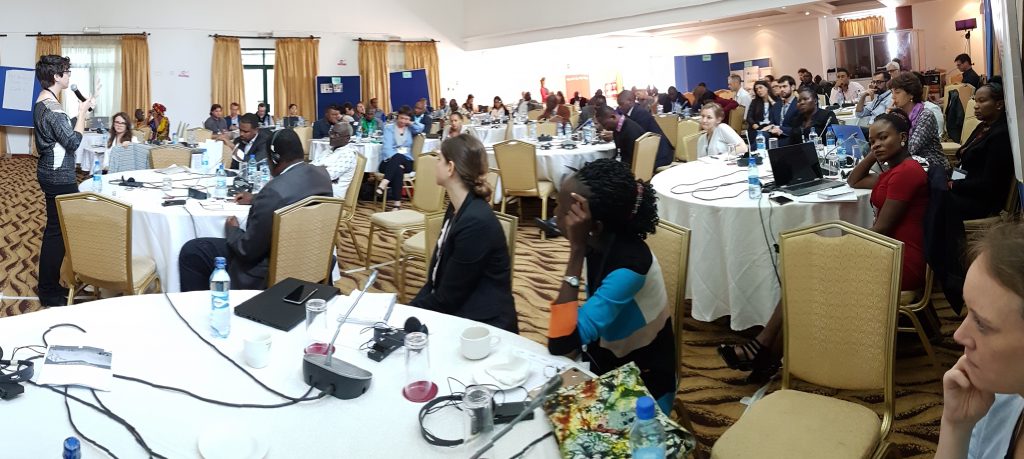Author: Liz Stephens
Many members of the FATHUM team came together for the Africa Forecast-based Financing Dialogue Platform in Nairobi to hear the latest on FbF and related topics across Africa. The German Red Cross will no doubt be writing a full report of the session, but here is some ‘I like I wish I wonder’ feedback from the FATHUM team.
I like –
- that the discussions were rich and interdisplinary – Harriet Lowalem, Makerere University
- the diversity of the current Fbf pilot approaches and the genuine excitement building up among the field’s growing group of practitioners. – Paris Kasiz, WFP
- learning how people around Africa are approaching FbF and seeing how the concept has evolved. – Arielle Tozier, German Red Cross Mozambique
- the diversity of participants and high interest on FbF – Irene Amuron, RCCC
-
the diversity of ideas on how to set up effective systems and take action at scale! – Erin Coughlan de Perez
-
the paradigm shift to Impact based forecasting and not just forecasting for the sake of forecasting – Beauty Shamboko
-
the variety of topical themes discussed regarding forecast based financing and actions – Chris Garimoi Orach, Makerere University
- finding out about all the FBF activities and research that is happening across the African continent – Joy Waddell, Stellenbosch University
- I like the thematic break-out sessions as they form a more intimate and fruitful platform to exchange ideas and challenges – Sara de Wit, Oxford University
- I would like to see more participants being aware of the huge size of African river basins and the need to support them with basic forecasting infra-structure. For example, the Limpopo basin has a size of 40 million hectares, some 4 times the size of England and includes highlands in South Africa and lowlands at the Indian Ocean, Mozambique. River flooding under these circumstances can have different genesis year by year. If we understand well the hazards we will have more time to act and the FbF mechanism will be fulfilling the role of reducing suffering of affected populations. Massive rains in Mozambique have started in the year 2000, on February 3, caused by the cyclone Eline originating from Australia.The resulting massive flooding of the Limpopo river happened in fact much later, on February 26. We had 23 days of lead time to act but we didn’t act because we did not understand well the “hazard”, the link between Cyclone Eline and the Limpopo flooding. – Rui da Maia, UDM

Erin Coughlan de Perez leading a session on forecast triggers. Photo: Liz Stephens
I wish –
- all agencies and actors in the field talked more with each other, recognizing and taking advantage of the tremendous potential for complementarities and synergies in their work! – Paris Kasiz, WFP
- there was better coodination among research initiatives pertaining to FbF (and I´m happy that the dialogue platform opened the lines of communication) – Arielle Tozier, German Red Cross Mozambique
- that the topics were all inclusive rather than selecting a few topics to attend – Harriet Lowalem, Makerere University
- we had given government representatives more centre stage to share practical examples on how FbF can be institutionalised within DRM government agency – Irene Amuron, RCCC
- that was more government representation including at national and sub-national levels – Chris Garimoi Orach, Makerere University
- Zambia will be able to have presentation on the progress made from the resolutions made at the Dialogue Platform – Beauty Shamboko
- we had more information on forecast verification, to know which actions should go with which forecasts. – Erin Coughlan de Perez
- that there was better collaboration and communication about FbF research across partners, organisations, and research projects. – Joy Waddell, Stellenbosch University
- I wish that there was more emphasis placed on the importance of community-level participation in the implementation of FbF – Sara de Wit, Oxford University
I wonder –
- to what degree and timeframe will Fbf be scaled in whole countries and regions, fully integrated within national systems as well as humanitarian operations. – Paris Kasiz, WFP
- whether lessons learned from fbf interventions shall necessarily apply in other local context during the scale up phase – Harriet Lowalem, Makerere University
- how best to use the research (and what research would be most valuable) to influence practice and build government support for early action – Arielle Tozier, German Red Cross Mozambique
- what the future of FbF will be without donor funding – Irene Amuron, RCCC
- about scale up of forecast based interventions – Chris Garimoi Orach, Makerere University
- if there will be more time allocaed for the next Dialogue Platform – Beauty Shamboko
- how the world might be different if we had open data. – Erin Coughlan de Perez
- what impact or difference our FATHUM research will have on the scaling up of FbF in countries and the application of FbF across the world. – Joy Waddell, Stellenbosch University
- I wonder how local forecasting systems (or environmental knowledge) and scientific models can complement and strengthen each other – Sara de Wit, Oxford University

Liz Stephens presenting progress in FATHUM forecasting research. Photo: Becky Hemingway, Met Office

